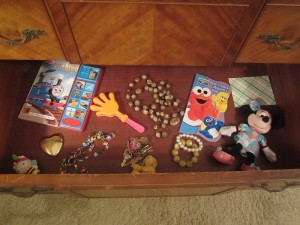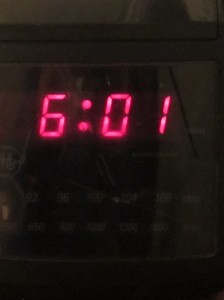Last weekend a bunch of us drove from our home in southwest Michigan to the Chicago area for a wedding. As we approached the city on the Dan Ryan Expressway, a disturbing sign caught my eye:
892 TRAFFIC DEATHS THIS YEAR DRIVE NOW TEXT LATER
 Surely all 892 weren’t killed as a result of texting, but some probably were. I know what it feels like to stray from my lane while texting and have done it just enough to say, “No more.” One second too many could exact a terrible price.
Surely all 892 weren’t killed as a result of texting, but some probably were. I know what it feels like to stray from my lane while texting and have done it just enough to say, “No more.” One second too many could exact a terrible price.
The other day Birgitta showed me an iPhone video taken through the front windshield of a squad car. An SUV in front of the policeman began drifting left. As it hit the shoulder, the driver must have looked up, recognized his error, and sharply overcompensated to the right.
He cut across several lanes and hit the side of a truck on the far right, bounced left across those same lanes and into oncoming traffic, and was hit head-on by a fast-moving 18-wheeler. The SUV and anyone inside were disintegrated on impact in an accident that took 5 seconds.
All of us are tempted to say, “I’ll just glance for a second.”
I wonder if similar life-devastation can happen when we look away from the Lord for “just a second.” The problem with texting while driving and also with taking our eyes off God probably isn’t as much about the quick look away as the getting stuck on what we’re looking at. Two seconds. Maybe three or four.
Whatever it is, it grabs our attention ever-so-slightly longer than the one second we promised ourselves. Suddenly we’re “stuck” and catastrophe occurs. It wouldn’t have happened at all except that whatever we were glancing at was, for those seconds, worth it to us.
The most devastating part of the whole thing is that there are no do-overs. If our quick peek turns into a longer one, it’s willful, risky, and a foolish gamble on our part. And if permanent damage gets done, whether while driving and texting, or in other areas of life when we let ourselves dwell on something we shouldn’t, back-peddling isn’t possible.
In hindsight, that just-a-second peek is virtually never worth it, because it doesn’t take much of a look to find us quickly invested in what we’re seeing. And when that happens, it gets more and more difficult to look back at God. As a matter of fact, it might be quite a while before we can pull our attention from what first distracted us to turn back toward him.
So hopefully, if we don’t text and drive, the odds are good we won’t be one of those numbers on Chicago’s expressway sign. Better than that, though, is not to take our eyes off God, not even for a second. If we focus exclusively on him, he’ll save us from many an accident.
“[Lord], turn my eyes from looking at worthless things; and give me life in Your ways.” (Psalm 119:37)




